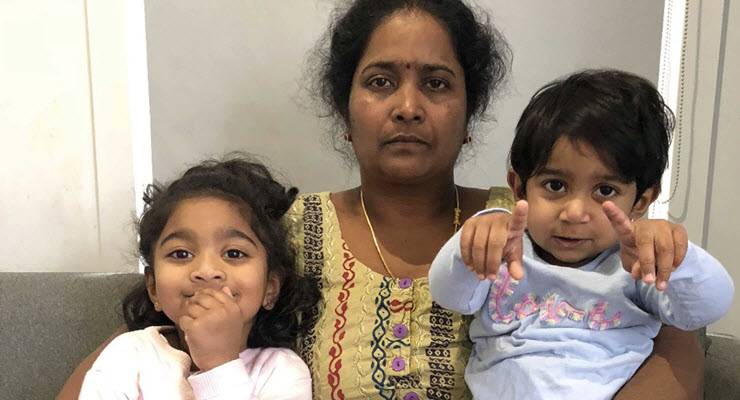
The family of four who are currently the sole occupants of the Christmas Island detention centre did not know of the government’s imminent plans to airlift and quarantine Australians from Wuhan at the centre until called by Crikey yesterday afternoon.
Asylum seeker Priya Murugappan started crying when called by Crikey and said: “I am very worried about how to protect my children. I want the government to transfer us back to Australia immediately so we are not at risk”.
In our interview, Priya outlined her concerns for the welfare of her daughters, Tharunicaa, 2, and Kopika, 4.
Both girls’ health has been compromised while in detention, and their parents are worried they could be at increased risk on the small and remote island if it is to host hundreds of evacuees from the coronavirus crisis in China.
They are baffled the government chose to activate the centre, pointing out that the island has very limited medical facilities. Priya, who has diabetes, injured her shoulder when she was dragged onto a plane by guards last year and says she has been unable to get a CT scan on the island. Local Christmas Islanders with complex fractures or mothers giving birth have to leave the island.
Tharunicaa has had multiple serious health concerns including infections resulting in oral surgery, a head injury and failure to gain weight since the family were taken from their home in Queensland and placed in detention 22 months ago.
Comcare is currently investigating the care of both girls at the Melbourne detention centre.
After a failed deportation effort last August, the family was moved from Melbourne to the newly-reopened Christmas Island detention centre. They were effectively removed from their supporters and the media’s gaze.
The centre was reopened last February at a cost of more than $26 million. The government has spent more than $4.5 million on detaining the family and paying departmental lawyers to fight the family’s legal appeals.
There are more than 100 staff at the centre, 96 of whom are equipped with body cameras. Four guards take Kopika to school each day.

The family has access to a computer in a monitored room that they can use to Skype. But, as reported by Crikey last October, the family has been forced to share a single queen-sized bed for months.
Is Christmas Island the best place for evacuees?
Australian Medical Association president Dr Tony Bartone told Today on Thursday that repatriating Australians evacuated from Wuhan to Christmas Island was not appropriate.
“[It’s] a place where it’s been previously the focus of populations under enormous mental and physical trauma and anguish,” he said. “We will be calling on the PM and the relevant ministers to find a much more humane solution to dealing with a group of very vulnerable and concerned group of Australians.”
Dr Peter Collignon, professor of infectious diseases at the ANU Medical School, told Crikey that the issue was ensuring people were kept in isolation.
“Wherever you put people, it’s about where we can clinically isolate people — whether you do that on Christmas Island or on the mainland. My view is that you’d think we can probably do it on the mainland,” he said.
Collignon said it was important to keep anyone travelling from these “high-risk areas” in isolation given that a small number of cases in Germany and China were spread by asymptomatic patients.
“We are better off overdoing it a little bit, rather than under-doing it, because we still have a chance of controlling this virus. And that means we go a little bit overboard for the next few weeks.”
Australians citizens in Wuhan have already voiced concerns and reluctance over the Christmas Island plan, including discontent that those who are airlifted to the island will be expected to make a financial contribution to the costs of their flight and accommodation.
Locals say there are several separate compounds within the detention centre, which has a capacity for about 2000 people, meaning the family may not come into contact with those who are in quarantine. But the family is still waiting be told how that will work on a daily basis. They already have to walk to a different part of the centre just to cook.
Collignon doesn’t know the government’s planned living arrangements for the repatriated Australians and the family, but he said the risk of infection could be managed in detention if people were separated, kept at least one or two metres from symptomatic patients, wore masks, and used an alcohol-based sanitiser.
The New Zealand government is working with Australia to evacuate its residents from Wuhan, but Foreign Affairs Minister Winston Peters said New Zealanders would not be joining Australians on Christmas Island — they’ll be quarantined on the New Zealand mainland.
Bartone said Australia had better solutions than sending evacuees to Christmas Island.
“It’s not up to me to suggest an area but the government has a number of facilities: everything from the defence sites [to] quarantine facilities which it could ramp up to meet this demand. Remember, Australian teams are going to Christmas Island to provide the necessary solutions. It’s not like Christmas Island has got the solution.”
Crikey put questions to the Department of Home Affairs yesterday including:
- Will the family be briefed and will a translator be used so there are no unnecessary concerns and they can be sure to have clear details regarding their family’s health?
- Is it safe to keep people and children with already compromised health in an area that is serving a dual purpose as a quarantine area?
- Will all vehicles and equipment that the family use or are transported in be kept exclusively for them during the time that others in quarantine arrive on the Island?
- Several sources say staff at the detention centre have recently been on holidays in areas where the coronovirus is active. Have staff been screened for the virus if they are in contact with the family already in the detention centre?
No answers were received before deadline.









Be careful how you phrase things. Pryia’s shoulder WAS INJURED instead of ‘Priya injured her shoulder’. Also re the strength of my password. Who cares?
Christmas island is an asset for Australia – it is ideal quarantine now that north head as closed, so it was an inspired location to solve this problem and protect Australians. One wonders where the AMA president received his medical training as he seems oblivious to the principles of infectious illnesses- highly contagious disease in the infancy of international contagion and death – his focus on the mental health distress seems to show complete lack of clinical nous. Seems that if you went to him with a broken leg – he would say we should do something about the little rash on your foot and ignore the break.
Why would anyone in their right mind accept an offer from the Australian Government to reside at the Christmas Island detention Centre, especially without a firm date of exit. This goes doubly if you aren’t white.
Regardless of whether isolating these evacuees on Christmas island is a good strategy or not, I am delighted so many will experience the hospitality dealt out by our detention facility. As they are Australian, there’s a better than average chance Morrison/Dutton will eventually permit them back on the mainland (maybe!) whereupon the media should pursue the hapless holiday-makers for their commentary & critiques regarding conditions at the facility.
We are normally denied the opportunity to hear the truth firsthand from someone with an Oz passport & with right of re-entry. Scotty from Marketing may not have factored this.
I heard an interview on ABC radio with a 20 year resident of Christmas Island, during which she explained that there were three separate detention areas on the island, and her understanding was that the quarantine people would NOT be housed in the same facility as the existing family there. She was not in favour of the influx, but that seemed to be because she thought it would affect tourism!
However…she did acknowledge that it would only be a ‘quarantine’ centre for a few weeks…so I can’t see how it will affect the existing family at all.
A succession of federal politicians have, for a number of years now, been able to vicariously enjoy the cruelty imposed on asylum seekers and others.
It would be unlike them to miss this opportunity even if the intended victims are Australians.